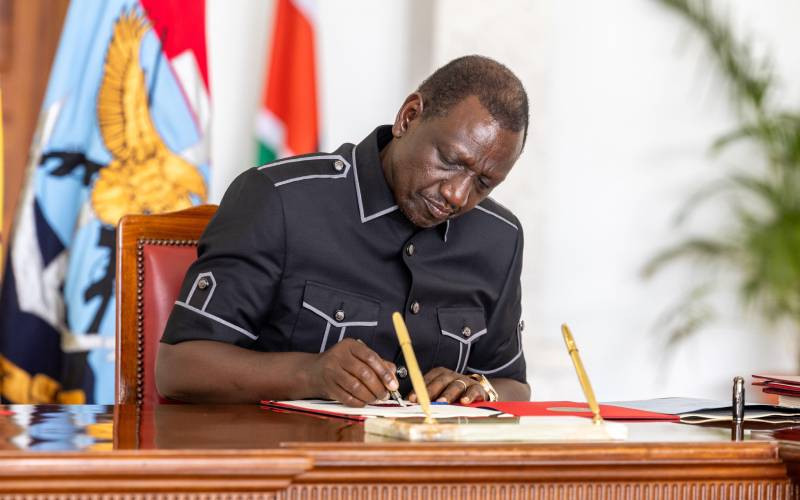Corruption has deeply entrenched our society. The fight against the vice will, therefore, be painful and difficult.
Those who have milked our coffers dry are no ordinary criminals who can be subjected to mob justice without raising hue and cry. They are men and women of a large following. They are in the echelons of power.
Countries that have sworn to fight against corruption have had to make tough choices. In South Korea, a President was impeached and sentenced to over twenty years in prison.
In Brazil, former President Lula da Silva was sentenced to jail this year, shattering his hopes of returning to the country's top seat.
At the time the court affirmed Lula's sentence he was a leading candidate in the Presidential polls slotted for October this year.
The examples of South Korea and Brazil show the extent to which a country may have to go in the fight against graft.
In Kenya, it is no secret that those bestowed with the responsibility of guarding the public coffers have often had a thirst for the same resources.
Our country has been rocked with numerous scandals from Goldenberg, to Anglo Leasing to the NYS, NCPB, and KPLC. Almost every project is laced with a corruption scandal.
The beneficiaries of the scandals have amassed great wealth to the extent that they control the economy.
Many questions have been asked on why Kenya has lagged behind in development, relative to her contemporaries at the time of independence such as Malaysia and South Korea.
The unanimous answer has been that corruption has robbed us of our potential. An outsider would be forgiven for imagining that the corrupt are loathed in Kenya.
Sadly, the contrary is true. Unscrupulous individuals are often hailed and in many instances considered as victims of persecution. Many people have emerged from corruption scandals as heroes. Some Kenyans even joke that the best way to join politics is to engage in a scandal.
Most of the people adversely mentioned in high profile corruption scandals enjoy either massive following from their tribal bases or have political patronage.
Their supporters are therefore not likely to laud the DPP for bringing the suspects to justice. To them, it is a persecution of their heroes.
Elections in Kenya have seen people of questionable integrity ascend to power. It is ironical to expect the same people to protect the public resources.
Stay informed. Subscribe to our newsletter
If we as Kenyans are keen on fighting corruption, we must start by kicking out all the corrupt leaders. We must take to the legislature men and women who are capable of holding the executive organs to account.
When the leaders know that they will be recalled the moment they deep their hands into the free jar, they will have every reason to shun graft.
While many Kenyans have been quick to shower the DPP with praises for leading the purge on graft, it must not be lost to us that the people who must be at the forefront of the war are the ordinary Kenyans.
The Constitution bestows the people with so much power. In article 1, it expressly states that all sovereign power belongs to the people.
One way in which the people exercise their sovereignty is through elections. The people have the ability to dismiss leaders that they deem as corrupt.
The fight against corruption cannot be left to one person or institution. It is a fight that must start with the ordinary folks shunning corruption even at the lowest level.
Those caught committing traffic offenses must be ready to face the judicial process rather than give bribes to police officers. Likewise, Kenyans must be willing to report any public officers who ask them for a bribe.
The straight path (devoid of corruption) is often not the most convenient, yet we must stick to it if we want a clean country. We must be ready to pay the price for standing for what is right. The war on corruption can never be won through shortcuts.
Those tasked with delivering justice must be adequately funded. They must be men and women of impeccable character.
Many times money has been lost from the public coffers without a trace. The cases touching on corruption often drag in courts for years, not because of lack of evidence but because the accused persons have compromised the system.
The institutions charged with fighting graft such as the office of the Director of Public Prosecution, the EACC and the DCI must be above reproach.
The arrests and prosecution of suspects must be devoid of theatrics. Kenyans need to be convinced that the war on corruption has no sacred cows neither is it meant to score political points. Any doubt cast on the intention of the war is likely to erode the goodwill that the fight already enjoys.
The biggest question that needs to be asked is whether Kenyans are ready to pay the price for the fight against corruption?
Are we prepared to accept the disruptions that the fight may cause? I don't think we have in any way braced ourselves for the consequences of this war.
The fight against corruption will only enjoy the goodwill as long as the prominent people are not touched.
 The Standard Group Plc is a
multi-media organization with investments in media platforms spanning newspaper
print operations, television, radio broadcasting, digital and online services. The
Standard Group is recognized as a leading multi-media house in Kenya with a key
influence in matters of national and international interest.
The Standard Group Plc is a
multi-media organization with investments in media platforms spanning newspaper
print operations, television, radio broadcasting, digital and online services. The
Standard Group is recognized as a leading multi-media house in Kenya with a key
influence in matters of national and international interest.
 The Standard Group Plc is a
multi-media organization with investments in media platforms spanning newspaper
print operations, television, radio broadcasting, digital and online services. The
Standard Group is recognized as a leading multi-media house in Kenya with a key
influence in matters of national and international interest.
The Standard Group Plc is a
multi-media organization with investments in media platforms spanning newspaper
print operations, television, radio broadcasting, digital and online services. The
Standard Group is recognized as a leading multi-media house in Kenya with a key
influence in matters of national and international interest.








